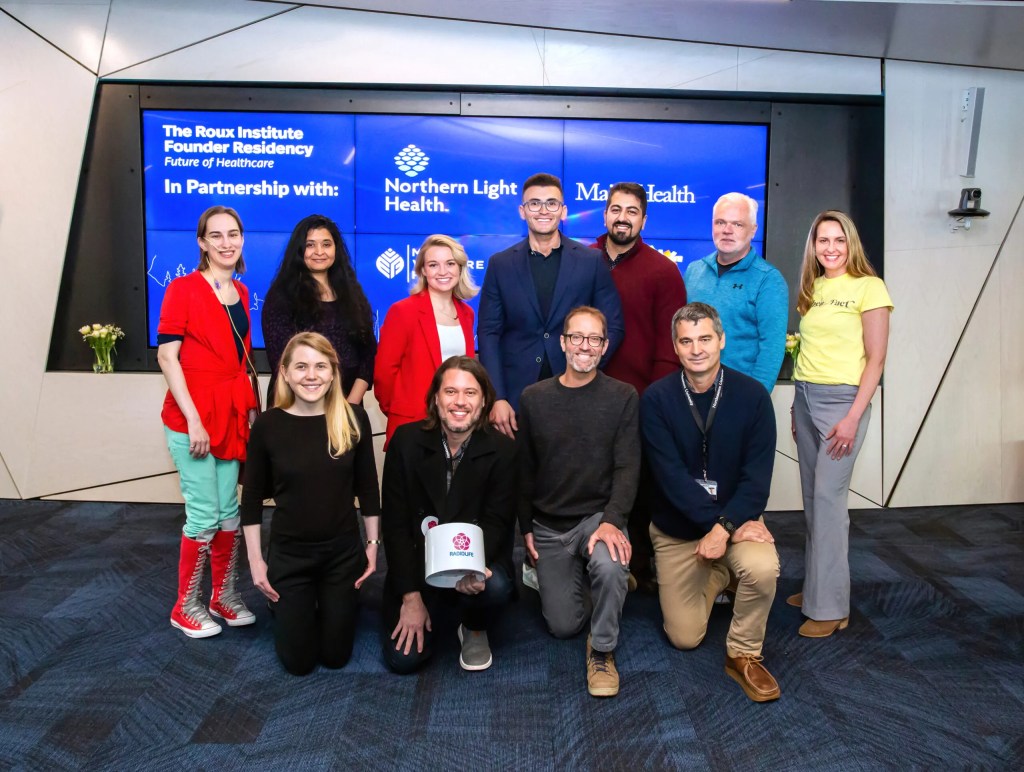The Roux Institute’s Future of Healthcare Founder Residency to jumpstart Maine’s health tech industry

Northeastern’s Roux Institute launched a new residency program this week for innovative companies in healthtech, with the aim of creating a thriving ecosystem in Maine that will improve patient care for residents of the Pine Tree State.
The Roux Institute kicked off the Future of Healthcare Founder Residency on Wednesday, welcoming its first cohort of nine companies to Portland. The year-long program is funded by Northern Light Health and MaineHealth, two of Maine’s leading healthcare providers, as well as the Maine Venture Fund. A spinoff of the Roux Institute’s Founder Residency, which focuses on people of color, LGBTQ+ and women-led companies, the Future of Healthcare Founder Residency will catalyze innovation and entrepreneurship in Maine’s healthtech economy.
“If you think about life sciences in Massachusetts, it wasn’t necessarily there 50 years ago, but the pieces were there,” says Ben Chesler, director of venture creation and acceleration at the Roux Institute. “We view this as taking the first step of creating that thriving healthtech sector here in Maine.”
Hailing from three countries and five states, the nine companies involved in the residency are focused on creating innovative healthcare solutions, from artificial intelligence virtual healthcare assistants to a medical device that can detect cancer cells in under 20 seconds.
“We look forward to the creative energy and inspiration of these founders to spark solutions, when successfully brought to market, that will improve the lives of patients and caregivers in Maine and across the country,” says Hugh Jones, senior vice president and chief strategy officer of Northern Light Health. “In choosing to pursue their passions here at the Roux, we know they will also be contributors to expanding Maine’s increasingly vibrant and diverse entrepreneurial ecosystem.”
As part of the program, each company receives a $50,000 investment and a vast array of programmatic, mentorship and institutional support. The Roux Institute also takes an equity stake in each company involved in the residency.
Although the financial investment is noteworthy, Allyson Goida, senior program manager for the program, says it is only a small piece of what companies will take away from the program.
“We really believe that the value lies in the three-month intensive workshopping where each founder is getting exposure to world-class experts within their field, whether it be in FDA and regulatory or successful founders that have a history in serial entrepreneurship in healthtech,” Goida says.
In addition, the companies, which will be co-located on the Portland campus during the program, get access to Northeastern’s vast mentor pool through the McCarthy(s) Venture Mentoring Network. Two Northeastern co-ops are dedicated to assisting the companies with everything from market research and investor reporting to designing company websites. To assist with the companies’ legal needs, the Roux Institute has a legal fellow who engages partnering law firms from Maine to provide pro bono services.
“Between our investors, our partners and the university there is deep integration with these startups, as opposed to, ‘Here’s a three-month business curriculum. You’re done,’” Chesler says. “That is fairly unique as far as universities supporting outside entrepreneurs.”
Chesler says the residency is a win-win-win for the Roux Institute, its healthcare partners and the companies involved in the program. It offers students an opportunity to work alongside healthtech innovators, providing an on-ramp into the industry, which will boost the local health tech industry. For MaineHealth and Northern Light Health, it provides access to cutting technologies that will, ultimately, benefit patients in Maine.
“Programs like the Future of Healthcare Founder Residency have the real potential to improve patient care, reduce healthcare costs and allow our care team to collaborate with community members on the evidence-based treatments of tomorrow right here in Maine,” said MaineHealth CEO Andy Mueller, MD. “MaineHealth is proud to partner with the Roux on this project as part of our vision of working together so our communities are the healthiest in America.”
On top of the funding and institutional support provided to them, the companies will be able to work with the Roux Institute’s healthcare partners to collaborate with clinicians, get feedback and launch potential pilots. The Future of Healthcare Founder Residency is just getting started. The Roux Institute has plans to support 30 companies over three years through the residency and is already exploring opportunities to create more Founder Residencies in areas like climate tech and ocean tech.
“This represents [Maine Venture Fund’s] commitment to fund 30 healthcare companies over three years who will each be surrounded by the deep expertise at both MaineHealth and Northern Light Health, and the close-knit Maine innovation ecosystem,” says Joe Powers, managing director of Maine Venture Fund. “The Roux Institute’s vision, ambition and global reach in attracting quality startup companies to Maine will have a ripple effect for the Maine healthcare system and the greater Maine economy for years to come as these companies evolve, and we’re thrilled to be a part of that.”
Goida says she hopes the residency can serve as an example to others for how to invest and innovate in the healthcare sector.
“The Roux Institute has filled a very unique role as a convenor for two major players of health in the state of Maine,” Goida says. “That is an opportunity for other states to possibly replicate. It’s a very unique niche that other Northeastern campuses may be able to fill through entrepreneurship across the system.”
The nine companies in the Future of Healthcare Founder Residency are:
- Althea (San Jose, California): developing an artificial intelligence virtual healthcare assistant that aims to ease staffing and burnout faced by healthcare providers
- Apriqot (Scarborough, Maine): creating a “community magnifying glass” that produces dynamic population health estimates to help highlight the factors behind inequities in health outcomes and, ultimately, inform policy
- Empallo (Boston): an MIT spinoff that is creating machine learning models that will ultimately produce more personalized treatment plans for patients with cardiovascular diseases and improve clinical trials
- EmTech Care Labs (Portland, Maine): developing a digital platform, Care-Wallet, to assist families in managing home-based long-term care
- Mother of Fact (Langdon, New Hampshire): a digital health platform provided to women’s health clinics that connect their patients with registered dieticians
- PragmaClin (St. John’s, Newfoundland and Labrador, Canada): a cloud-based patient monitoring and assessment tool to help neurologists assess the progression of Parkinson’s Disease in their patients
- Radiolife (Wilmington, Delaware): a startup developing a medical device called Cube Scan that can detect the presence of viruses, bacteria and even cancer cells in under 20 seconds
- Stratos Medical (Galway, Ireland): an early stage company that is working on its first product, TrackSmart, a device that aims to make vascular access easier and less damaging during hemodialysis sessions
- 119 (Ohio): a communication tool designed to guide bystanders through the appropriate response in emergency situations
Cody Mello-Klein is a Northeastern Global News reporter. Email him at c.mello-klein@northeastern.edu. Follow him on Twitter @Proelectioneer.






